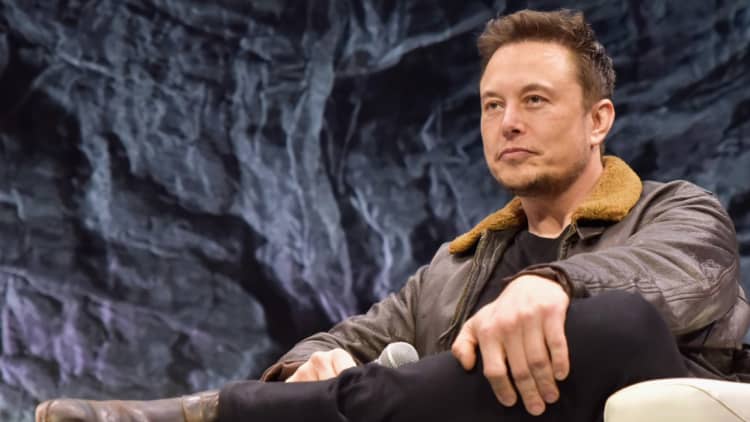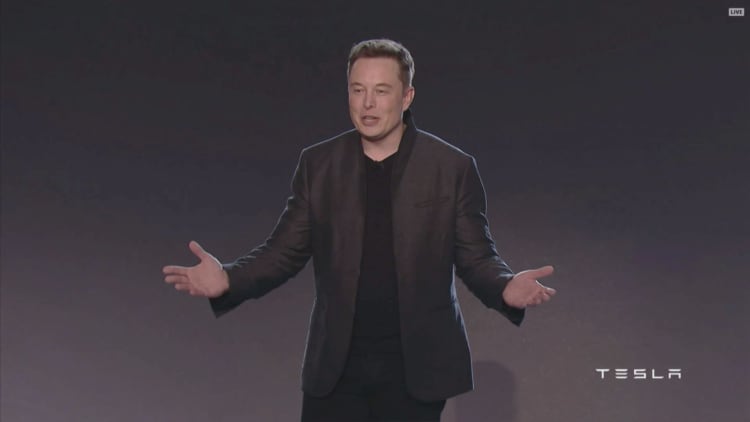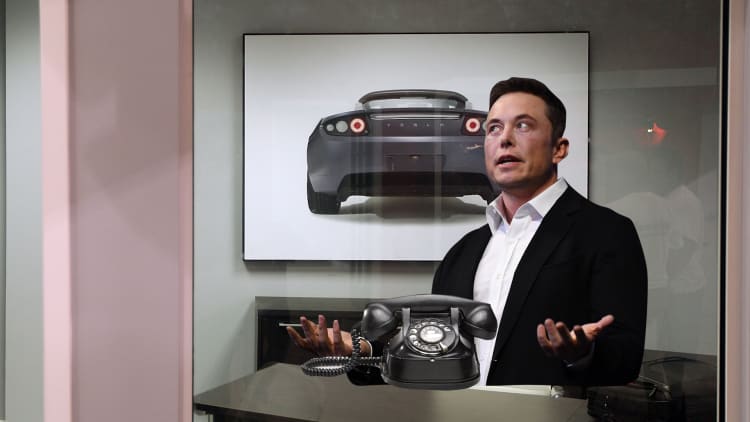Billionaire entrepreneur Elon Musk shocked Wall Street on Tuesday with a tweet in which he said he wants to take Tesla private at a price of $420 per share. Such a deal would value the electric car company at roughly $70 billion.
Many of Musk's 22 million Twitter followers wondered whether or not he was serious — the price Musk quoted is a marijuana reference, after all — but, the Tesla CEO later confirmed in a blog post that he is seriously considering the move. Musk wrote in the blog post that "a final decision has not yet been made," but he noted previously that the company had already secured the funding it would need to complete the deal.
Musk says he would remain CEO if Tesla goes private.
What it means to go private
Musk took Tesla public in a 2010 initial public offering, which means its stock was sold to the public for the first time on an exchange, in this case, on Nasdaq.
Typically, a publicly traded company goes back to being private through a transaction like a leveraged buyout, where either the company's management or an outside party, like a private equity firm or some other private company, borrows a large amount of money in order to buy all of the company's publicly traded shares from its shareholders. In this case, Musk has said he has already lined up the funding he would need to offer the company's shareholders $420 for each of their Tesla shares. (For what it's worth, though, on Tuesday, CNBC contacted multiple Wall Street banks and none of the institutions said they knew anything about a Tesla deal or had committed any financing to a leveraged buyout of Musk's company.)

Such a deal typically offers a premium over the company's recent stock price in order to sweeten the offer and give shareholders a reason to sell their stakes, and indeed, that $420 Musk has quoted represents about a premium of 20 percent over Tesla's share price after Thursday's earnings call. (Tesla shares jumped on the news of Musk's announcement on Tuesday and trading was briefly halted by Nasdaq. The stock was trading at roughly $372 per share on Wednesday afternoon, or around 11 percent below $420.)
Once all of the company's public shareholders have sold their stock (usually as a result of a majority shareholder vote), the company is delisted from any public stock exchange and any remaining stakeholders — which could include private equity buyers, management, founders and even employees with stakes in the company — will hold shares in the private company. Those private shares cannot be traded on a public exchange and, in many cases, they need to be offered back to the company itself, or to other existing shareholders, in order to change hands.
In Tesla's case, Musk says he actually wants as many of the company's current shareholders to hold on to their stakes in the company should it go private. "My hope is for all shareholders to remain, but if they prefer to be bought out, then this would enable that to happen at a nice premium," he wrote in his blog post. Musk also says of Tesla's shareholders on Twitter that he plans to "ensure their prosperity in any scenario."
Of course, the more Tesla shareholders who decide to keep a stake in the private version of Tesla rather than accepting a $420 per share buyout, the less money that Musk and his unidentified financial backers would actually need to take the company private.
Why public companies go private — and why Tesla might
Sometimes, a company's management and shareholders see going private as a prime opportunity to instantly cash out their holdings in a company at a considerable premium instead of having to bet that the company's shares will eventually gain a comparable amount of value on the stock market.
In other cases, a company might want to avoid some of the pressures of being public, such as having to regularly file public documents showing the company's latest finances, as well as the pressure from public markets to hit short-term goals, which can send stock prices swinging wildly from day to day, causing shareholder distress.
Based on his comments, Musk's reasoning presumably has something to do with the pressures of being public.
In the past, Musk has clashed with Wall Street analysts on earnings calls when Tesla reports its quarterly numbers,
In the past, Musk has clashed with Wall Street analysts on earnings calls when Tesla reports its quarterly numbers — on a call in May, Musk called a question "boring" after he was asked about gross margins on Tesla's Model 3. By taking Tesla private, Musk would no longer have to deal with quarterly earnings calls and the pressure for the company to hit specific quarterly financial goals.
"Being public also subjects us to the quarterly earnings cycle that puts enormous pressure on Tesla to make decisions that may be right for a given quarter, but not necessarily right for the long-term," Musk says in his blog post.
Being a public company also means that every piece of news, or financial results, from Tesla can affect the company's share price for better or worse. That can be a source of frustration, Musk writes.
"As a public company, we are subject to wild swings in our stock price that can be a major distraction for everyone working at Tesla, all of whom are shareholders," he writes. Musk believes that Tesla is "at our best when everyone is focused on executing" the company's long-term strategy, rather than getting distracted by short-term goals, he says.
He also wrote in his blog post on Tuesday, that the move would be "all about creating the environment for Tesla to operate best." And in November, Musk said he wished Tesla was a private company, telling Rolling Stone: "It actually makes us less efficient to be a public company."
Other companies have gone from public to private
In 2016, Fortune informally polled a group of CEOs and found that more than three-quarters of them agreed that it would be easier to manage their companies if they were private, rather than public.
One reason Fortune cited for public companies deciding to go private was the threat of activist investors, which are shareholders who buy large numbers of a company's shares in order to influence the company's direction through shareholder votes, or even to obtain a seat on the company's board of directors. Activist investors can be a thorn in the side of company management if they disagree with a company's direction, and they played a prominent role in the decisions of companies like computer company Dell and the grocery chain Safeway to go private in 2013 and 2014, respectively.
Another big company that recently left the public market to go private is the fast-casual food chain Panera, which sold to privately held German conglomerate JAB Holding for $7.5 billion in 2017. Panera CEO Ron Shaich said at the time that going private would allow the company to focus on long-term goals by avoiding the pressure of hitting specific quarterly results. "What is hard for me is the continual pressure on the short term," Shaich told CNBC.

What's next?
Whether or not Tesla actually goes private could come down to its shareholders. With funding for the deal in place, according to Musk, the move would at least hinge on a majority of Tesla shareholders voting to either sell their shares or remain stakeholders in the private version of Tesla.
Another obstacle could be a potential investigation by the Securities and Exchange Commission, which has already reportedly opened an inquiry into Musk's surprising tweets on Tuesday. The issue the federal agency is reportedly investigating is whether or not Musk violated SEC rules by tweeting about a potential transaction involving his public company that resulted in major stock price movement. The SEC is reportedly in touch with Tesla to confirm that Musk's tweets were factual — in other words, that Tesla is legitimately considering going private — as he could have violated federal securities laws if he was merely bluffing or speaking off the cuff.
Don't Miss:
Elon Musk: Starting SpaceX and Tesla were 'the dumbest things to do '
Like this story? Subscribe to CNBC Make It on YouTube!


